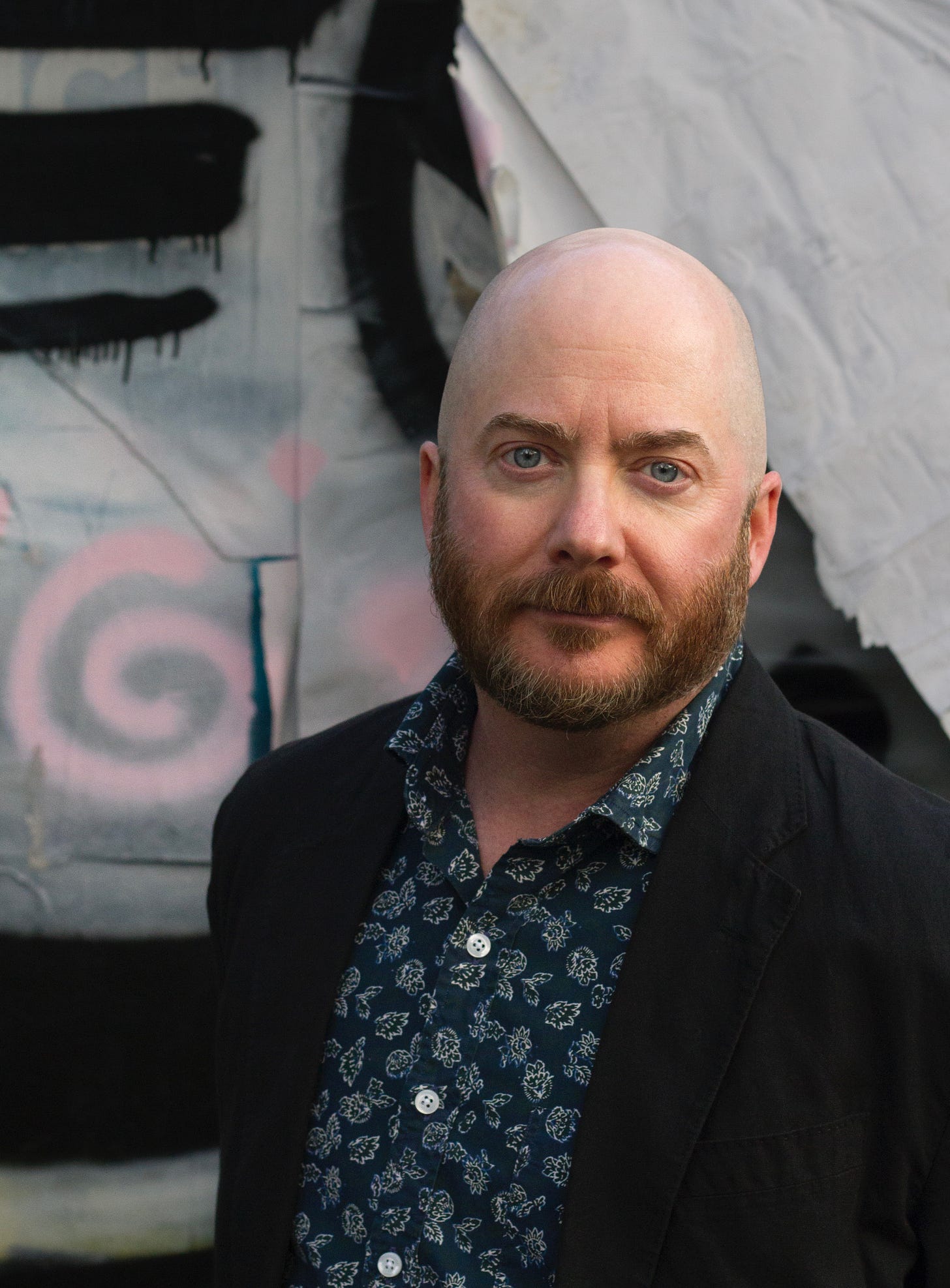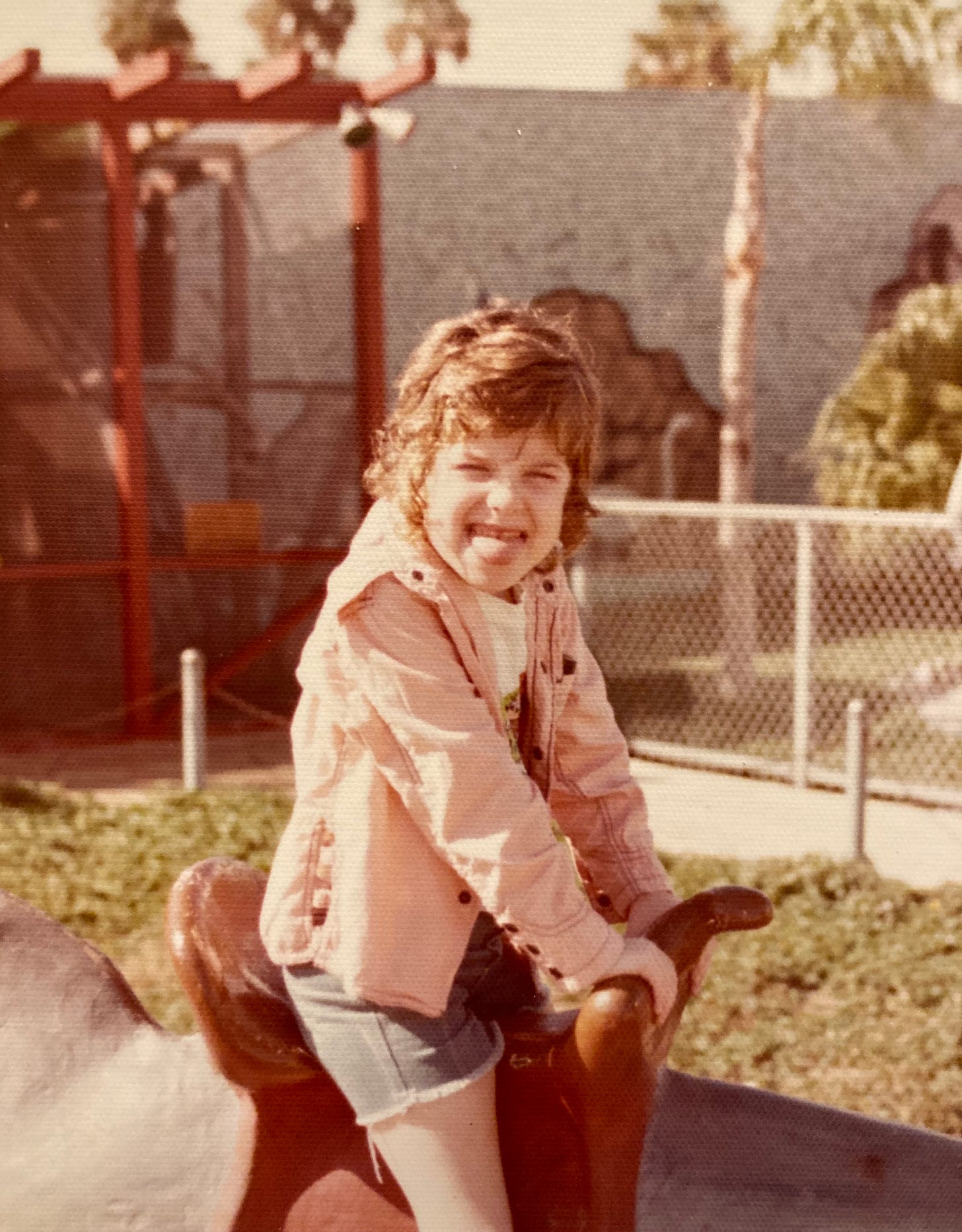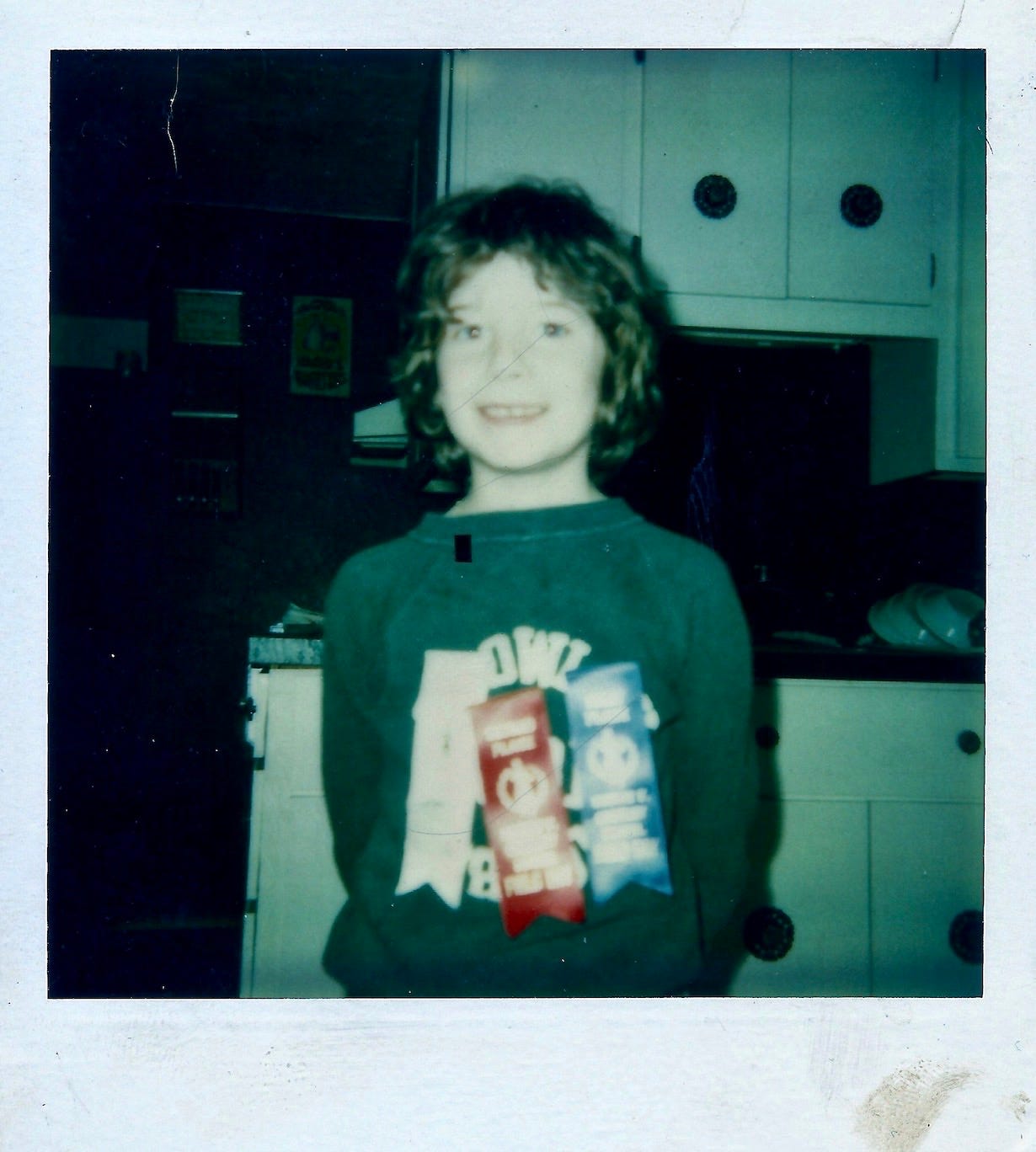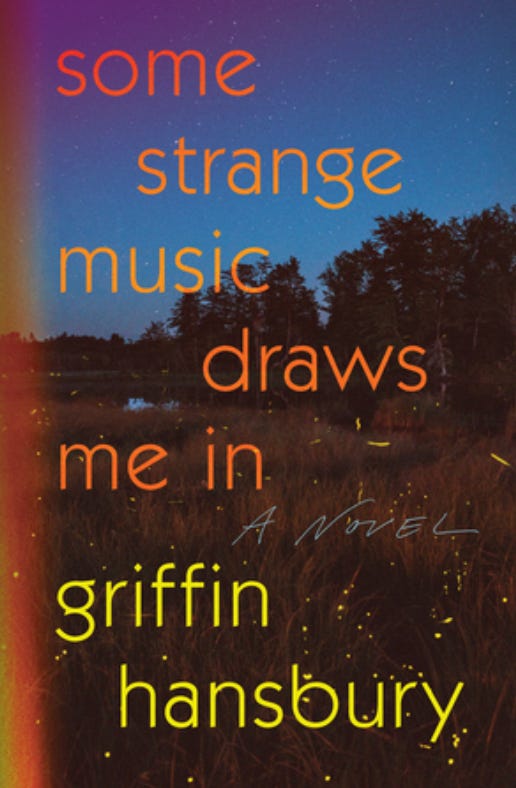This is 52: Author Griffin Hansbury Responds to The Oldster Magazine Questionnaire
"I am not yet in the 'I don’t give a shit what anyone thinks' stage of life, but I can see it coming. And I look forward to it."
From the time I was 10, I’ve been obsessed with what it means to grow older. I’m curious about what it means to others, of all ages, and so I invite them to take “The Oldster Magazine Questionnaire.”
Here, psychoanalyst and author Griffin Hansbury responds. -Sari Botton
P.S. A reminder that in my book, everyone who is alive and aging is considered an Oldster, and that every contributor to this magazine is the oldest they have ever been, which is interesting new territory for them—and interesting to me, the 58-year-old who publishes this.
When you see a piece featuring someone younger than you, try to remember when you were that age and how monumental it felt. Bring some curiosity to reading about how the person being featured is experiencing that age. Or, if you prefer, wait for the next piece featuring someone in your age group. Not every piece will speak to every reader. I’m doing my best to cover a lot of ground and to foster intergenerational conversation. Please work with me.
Griffin Hansbury is the author of Some Strange Music Draws Me In, a novel, along with Feral City and Vanishing New York (both written as Jeremiah Moss). His writing has appeared in n+1, The New York Times, The New York Daily News, and online for numerous publications, including The New Yorker, The Paris Review, and The Atlantic. A trailblazer in the field of psychoanalysis, he was the first analyst to practice and publish widely as openly transgender. He works in private practice in Manhattan.
--
How old are you?
52
Is there another age you associate with yourself in your mind? If so, what is it? And why, do you think?
For a long time, in my 20s and 30s, I thought of myself as perpetually 27. I don’t know why. Maybe it was because all those rock stars famously died at 27. Jimi Hendrix, Jim Morrison, Janis Joplin. It felt like an ultimate age, the end of youth. These days, I feel 40. I liked being 40. It felt solid and grounded, but also energetic, the youth of middle age, finally a real adult but yet not over the hill.
Transition stops time as it also sends you back in time, where you re-do puberty and adolescence. You lose maybe a decade to the very arduous physical, emotional, and financial work of transition while many of your cis-heteronormative peers are advancing through life—career, marriage, children, homeownership, all those “normal” milestones.
Do you feel old for your age? Young for your age? Just right? Are you in step with your peers?
I feel both old and young for my age. Old because my knees hurt, my hip hurts, and I am seeing life now from what feels like the other side of some transition point. I feel younger because, in some ways, I feel behind many of my peers. I think of this as a trans, and often queer, experience. Transition stops time as it also sends you back in time, where you re-do puberty and adolescence. You lose maybe a decade to the very arduous physical, emotional, and financial work of transition while many of your cis-heteronormative peers are advancing through life—career, marriage, children, homeownership, all those “normal” milestones.
I find it useful to think of Elizabeth Freeman’s concept of “chrononormativity,” which describes the way that capitalism and patriarchy convince us that there’s a right way to progress through life and that way maximizes productivity and reproductivity. Queer and trans people are often outside of that, but we also measure ourselves against it and that can feel like failure. At the same time, there’s a tremendous liberation to being out-of-sync with what is normal. You have more space to do what you want with your life. I explored some of this in my book Feral City.
I also feel younger than my age because I became active in activist movements and those groups are populated mostly by young people. Activists are also behaving outside and against the dominant norm. There is an against-ness that is more socially permitted during youth, and then, when you’re older, if you continue going against the grain, you will be accused of immaturity, told to grow up. But there are plenty of punks and queers, and many artists, who hold on to that against-ness throughout life. The way the world is going, we should all be resisting. We should all be screaming in the streets.
What do you like about being your age?
I like making a stable, decent income. It took me a long time to get here. I think part of my backwardness, my feeling out of step with my peers, is not just about being queer and trans, but also about coming from a lower-class background and transitioning to a college-educated, upper-class position. I worked so hard to get here and I’m still working, but not as hard, and that’s a relief. I enjoy the work I do, as a psychoanalyst. It’s full of meaning and emotion. It’s humane and deep. I’m very fortunate to be able to do it, and also to write creatively and (finally) be published. Of course, the old feeling of scarcity, with all its attendant anxieties, doesn’t go away. I’m still adjusting to a sense of security.
What is difficult about being your age?
I have the sense that I am in a transition at the moment. I am not yet in the “I don’t give a shit what anyone thinks” stage of life, but I can see it coming. And I look forward to it. So I feel like I’m in a difficult age, between old conceptions of myself and new ones that are just beginning to come into being. It’s a struggle. It feels like an existential crisis sometimes, which can be a good thing, it’s just rocky to move through. I’m not there yet—wherever “there” is.
Sometimes I want to fast-forward through my 50s and get to my 60s already, as if that will relieve me of all my trying and land me in a place of peace. But I’ve never been at peace—with myself, with the world around me—so why should it come in my 60s? We are all, always, ourselves.
The more I live, and the more I do the work I do, the more I come to see that what can change in us is not who we are, or even how we are, but how we relate to who we are. I’ve always been a compulsive and prolific diarist and when I read my old diaries, I am almost startled to see that I am the same person I was at age 15 and 25. I have the same concerns, same aspirations and ways of looking at the world. Hopefully, I’ve developed more compassion for those parts of myself that give me trouble.
Capitalism—and its wellness industry—insists that we always “improve,” become healthier, happier, and more successful, keep striving for the myth of perfection, including some idea of a perfectly Zen and joyful mental state. But maybe the goal in life is to transform, as Freud famously put it, “neurotic misery into ordinary unhappiness.” The only way I know to get there is through grieving, and getting older can be a process of moving through grief for all that gets lost along the way, including ideas about who we should be and how we should feel.
I think part of my backwardness, my feeling out of step with my peers, is not just about being queer and trans, but also about coming from a lower-class background and transitioning to a college-educated, upper-class position. I worked so hard to get here and I’m still working, but not as hard, and that’s a relief.
What is surprising about being your age, or different from what you expected, based on what you were told?
Whenever I’m watching older movies or TV shows, I’m constantly going online to look up how old the actors were. And I’m often stunned to see that they’re younger than I am—they’re playing the parents of teens, or serious businesspeople in suits, or whatever, and they’re younger than me. They have houses and cars and they behave like older adults in some sort of way that’s hard to describe. I suspect this is related to that trans/queer feeling of not being my age. Like I’m supposed to be somewhere else in time, but I’m not. I’m still behind.
What has aging given you? Taken away from you?
Aside from stability and financial security, to some extent, it’s given me a life to look back on with clearer sight, like seeing yourself from a high hill, having that perspective, being able to connect the dots along your path, see how you got here and who you are. Youth is cloudy. You can’t see yourself well. It takes time to know oneself. I’ve done a lot of personal psychoanalytic work as well. It’s not just aging that gives you perspective. Plenty of people passively age and end up going out just as unconscious as they came in. You have to do the work. And it’s never done. I think we never fully “arrive” because that idea of arrival is a fantasy.
What aging has taken away is mostly physical for me. I still move around a lot, but my joints ache. I miss being able to plop down onto the ground and then pop back up. Now those motions are a bit arduous and I feel like a bear lumbering around. I also feel more invisible. Women talk about this more than men do, but it happens to men too as they age. You can feel your social value going down, especially if you live in a youth-filled neighborhood, like I do, or if you’re writing and trying to publish, as I do. Fortunately, people want their psychoanalysts to be older. I’m in a field where age is associated with wisdom and, therefore, more desirable.
How has getting older affected your sense of yourself, or your identity?
One gift of getting older as a trans person is that you get the benefit of the work that younger people are doing to expand notions of gender and the body. I transitioned 30 years ago, so I’ve evolved through generations of transness. When I was coming out in the 1980s and 90s, there was a very limited, binary idea of how to be trans. We understood that we had to conform to rigid patriarchal ideas of masculinity and femininity, and to sever ourselves from our pasts, including our past experiences of birth-assigned genders. That severing can be useful, temporarily, to help make a break, but I believe it is detrimental in the long-term—for anyone, trans or otherwise.
I love this quote from Joan Didion: “I think we are well-advised to keep on nodding terms with the people we used to be, whether we find them attractive company or not. Otherwise they turn up unannounced and surprise us, come hammering on the mind’s door at 4 a.m. of a bad night and demand to know who deserted them, who betrayed them, who is going to make amends.”
Getting older—and having decades of time behind me—has enabled me to become more integrated with past parts of myself. Though the job is not complete. This is all a work in progress. My recent novel Some Strange Music Draws Me In, is very much about this phenomenon, a middle-aged Gen-X trans man looking back on his so-called “girlhood” in the 1980s, while he also grapples with being a trans elder in a Gen-Z world, and working to bring it all together.
I see young trans people doing that integration work much earlier in life, and I believe that is due to the increased presence of trans people and the attendant opening up of options that comes with larger community and diversity. We don’t have to live the old way anymore. There are many paths to take.
It takes time to know oneself. I’ve done a lot of personal psychoanalytic work as well. It’s not just aging that gives you perspective. Plenty of people passively age and end up going out just as unconscious as they came in. You have to do the work. And it’s never done. I think we never fully “arrive” because that idea of arrival is a fantasy.
What are some age-related milestones you are looking forward to? Or ones you “missed,” and might try to reach later, off-schedule, according to our culture and its expectations?
These days, I feel like I’ve done almost everything I set out to accomplish in life. That’s a big statement to make, but it feels true at the moment, and it’s a major part of my current existential crisis. I’m faced with the question of: Now what? My therapist keeps telling me to “tend your garden.” I can’t think of anything more boring. I’ve spent my life digging, planting, fighting off predators, enduring the weather, putting my head down and forging on. It feels like a lot of fighting to exist and get things done. Now what? Tend the garden? Boring! So I’m trying to resist my knee-jerk defensive reaction and to make some space to teach myself about stillness and the pleasures of doing nothing. Or just doing what I do, not needing to constantly grow or improve. It’s not easy for me to be unproductive. That’s internalized capitalism right there.
What has been your favorite age so far, and why? Would you go back to this age if you could?
40, for the reasons stated above, and yes, I would go back. Sort of. Mostly for the physical vitality and to recapture what feels like a decade I lost to gender transition. I’d like to be ten years younger in chronological age but still be where I am today in life.

Is there someone who is older than you, who makes growing older inspiring to you? Who is your aging idol and why?
My maternal grandmother lived to 106, with all her marbles, still cooking for herself and living alone in her own home. She defied everything that the wellness industry tells us about longevity. She was fat and fine with it, never exercised a day in her life, ate Lorna Doone cookies for breakfast, always kept a bowl full of peanut M&Ms on hand, and cooked everything in oil. She was sedentary, poor, and uneducated—she quit school at age 13 to work in a factory. She had cancer and a pacemaker and a titanium rod in her leg. She just kept on ticking. She laughed easily and enjoyed being alive. Her last words were, “I want more.” While I have no desire to live to 106, especially in this apocalyptic world, she inspires me every time I fail to exercise, or when I eat an extra cookie, because she’s my proof that none of that shit really matters. It’s all genetics, luck, and maybe a bit of stubbornness.
What aging-related adjustments have you recently made, style-wise, beauty-wise, health-wise?
I take fish oil capsules. I sometimes take a little of the gray out of my beard with Just For Men hair dye. I should see a physical therapist for the chronic pain in my hip, but I don’t. I am trying to do a little yoga, now and then.
One gift of getting older as a trans person is that you get the benefit of the work that younger people are doing to expand notions of gender and the body. I transitioned 30 years ago, so I’ve evolved through generations of transness. When I was coming out in the 1980s and 90s, there was a very limited, binary idea of how to be trans.
What’s an aging-related adjustment you refuse to make, and why?
I can’t think of anything. Except maybe that physical therapist that I won’t go see. But that’s more about things other than aging.
What’s your philosophy on celebrating birthdays as an adult? How do you celebrate yours?
I’ve never much liked birthdays, so I usually do nothing much or just have a little get-together with a couple of people I’m close to. This has nothing to do with aging, I’m just not a fan of birthdays. I usually have some psychosomatic flare-up of back pain or migraine around my birthday. Maybe it’s birth trauma! Who knows? Maybe it’s leftover gender trauma, the horror of having to put on a dress and receive gifts that misinterpreted me and were often a massive disappointment. So, birthday celebrations? I can take them or leave them. Unless they end in a zero. Then I want a big party with all my friends. I had a great 50th birthday party. It was during Covid, so we celebrated outside in Prospect Park on a temperate spring day, drinking nutcrackers, eating cake, dancing to music on the grass and feeling very free. And young.









I loved this for myself and I loved this for my trans son, who is growing into himself as part of a community that was forged over the last few decades by folks like Griffin. All the trans folks I know who are of an age with me, like Griffin, are just deeply thoughtful about themselves and the world in a way that I'm so grateful to be in proximity to. They don't take any of the stories of our culture as givens. They see them as worthy of question, but also alive. As in, you can change them, pull them apart and retell them in a way that paves the way for freedom for everyone. Thanks for this, Sari. And Griffin!
This was a lovely read. Two things really resonated - “there’s tremendous liberation to being out of sync with what is normal” and Griffin’s comments about looking forward to 60, expecting to achieve some state of peace, while acknowledging he’s never had it, so why expect it will come? I find myself often thinking about both of these concepts and I’m grateful that he offered language articulate them.